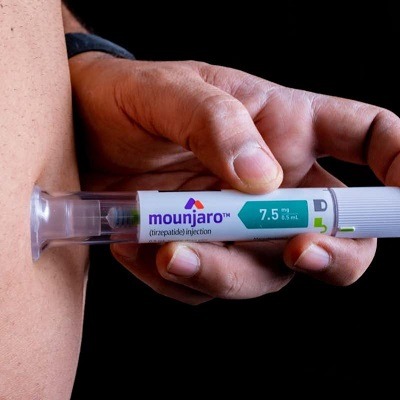How Mounjaro Injection Affects Physical Activity Levels: Insights and Considerations
How Mounjaro Injection Affects Physical Activity Levels: Insights and Considerations

Mounjaro, a relatively new medication, has become increasingly popular for managing type 2 diabetes and aiding in weight loss. However, like any medication, it comes with certain contraindications and considerations that should be fully understood before starting treatment. In this article, we will explore the contraindications associated with Mounjaro Dubai, with a special focus on its use in Dubai.
What is Mounjaro Injection?
Mounjaro (tirzepatide) is an injectable medication primarily used for the treatment of type 2 diabetes. It works by mimicking the actions of two naturally occurring hormones—GIP (Gastric Inhibitory Polypeptide) and GLP-1 (Glucagon-Like Peptide 1)—to help regulate blood sugar levels. Additionally, it has been shown to aid in weight loss, which makes it a dual-purpose medication for individuals battling both diabetes and obesity.
How Mounjaro Works
Mounjaro helps control blood sugar levels by improving insulin sensitivity and reducing the amount of glucose produced by the liver. It also slows gastric emptying, which can help reduce appetite and promote weight loss. The medication is administered via weekly subcutaneous injections and is typically prescribed for adults with type 2 diabetes who are unable to control their blood sugar levels through oral medications alone.

Contraindications of Mounjaro Injection
Before using Mounjaro injections, it is important to be aware of potential contraindications—conditions or factors that may make the drug unsuitable for certain individuals. Below are some common contraindications for Mounjaro injections.
1. Allergic Reactions
One of the primary contraindications for Mounjaro is a history of severe allergic reactions to tirzepatide or any of the ingredients in the medication. Symptoms of an allergic reaction could include difficulty breathing, swelling of the face, lips, tongue, or throat, and skin rash. Individuals who experience any of these symptoms should immediately seek medical attention and avoid using the medication.
2. Personal or Family History of Medullary Thyroid Cancer (MTC)
Mounjaro has been associated with an increased risk of medullary thyroid cancer (MTC), a rare but serious type of cancer. As a result, it is contraindicated for individuals who have a personal or family history of MTC or who have been diagnosed with Multiple Endocrine Neoplasia syndrome type 2 (MEN 2). Patients with these conditions are at an elevated risk of developing thyroid tumors when using medications that affect the thyroid, including Mounjaro.
3. Pancreatitis
Individuals with a history of pancreatitis (inflammation of the pancreas) should avoid Mounjaro injections. This medication has been linked to an increased risk of acute pancreatitis, and patients with this condition may experience worsened symptoms. Mounjaro should be avoided in patients who have had acute pancreatitis or other pancreatic disorders.
4. Severe Gastrointestinal Issues
Because Mounjaro in Dubai affects gastric motility, it may not be suitable for patients with severe gastrointestinal issues, including gastroparesis or severe constipation. This medication can slow the emptying of the stomach and exacerbate symptoms of digestive disorders. Patients with these conditions should consult their healthcare provider to assess whether Mounjaro is appropriate for them.
5. Pregnancy and Breastfeeding
Mounjaro injections are not recommended for use during pregnancy, as there is insufficient data regarding its safety for both the developing fetus and the mother. Additionally, Mounjaro is not recommended for breastfeeding women, as it is not known if tirzepatide passes into breast milk. Women who are pregnant, planning to become pregnant, or breastfeeding should discuss alternative treatment options with their healthcare provider.
6. Kidney and Liver Dysfunction
While Mounjaro does not require dose adjustments for mild to moderate kidney or liver impairment, caution is advised when using the medication in patients with severe kidney or liver issues. Mounjaro’s safety in individuals with end-stage renal disease or severe hepatic impairment has not been established, so these patients should generally avoid using the medication or use it under close medical supervision.
7. Concomitant Use with Other GLP-1 Agonists or Insulin
Mounjaro is a GLP-1 receptor agonist, and using it alongside other GLP-1 agonists or insulin may increase the risk of hypoglycemia (low blood sugar). It is crucial for patients to inform their healthcare providers about all medications they are taking to prevent any potentially harmful interactions.
8. Age Restrictions
While Mounjaro is approved for adults, it has not been studied in children. As such, Mounjaro should not be used in individuals under the age of 18 unless prescribed by a healthcare provider and deemed necessary under specific circumstances.
Mounjaro Injection in Dubai: Local Considerations
In Dubai, as in many countries, Mounjaro injections are becoming more common as a treatment for type 2 diabetes and weight management. However, before initiating treatment with Mounjaro, residents should consider several local factors, including healthcare access, regulatory approval, and cultural considerations.
1. Healthcare Access and Prescription
Mounjaro is available in Dubai through licensed healthcare providers. Patients should visit a local healthcare clinic or hospital for an initial consultation and evaluation to determine if Mounjaro injections are appropriate for them. Given that this medication is often prescribed as part of a broader diabetes care plan, it is essential to work closely with a healthcare professional to monitor progress and manage potential side effects.
2. Regulatory Approval
As of now, Mounjaro is FDA-approved for use in the United States and other regions, including Dubai. However, patients should always check that the medication is available through a licensed pharmacy and prescribed by an authorized healthcare professional. Regulatory guidelines ensure that medications are safe and effective for the public, which is particularly important when using new medications like Mounjaro.
3. Cultural Considerations
In Dubai, the use of medications like Mounjaro for weight loss or managing chronic conditions like diabetes is becoming more accepted. However, patients should be mindful of cultural attitudes towards obesity and weight management. Healthcare professionals in Dubai may offer a comprehensive treatment plan that incorporates dietary advice, lifestyle changes, and exercise in addition to medication.
4. Cost and Availability
Mounjaro may be more expensive in Dubai compared to other regions due to import costs and availability. Patients seeking Mounjaro injections in Dubai should discuss treatment costs with their healthcare providers or check with local pharmacies about the availability and pricing of the medication.
Monitoring and Side Effects
It is important to monitor for potential side effects while using Mounjaro. Common side effects include nausea, vomiting, diarrhea, and headaches. In most cases, these symptoms subside as the body adjusts to the medication. However, patients should immediately report any severe or persistent side effects to their healthcare provider.
Conclusion
Mounjaro injections are a promising treatment option for those managing type 2 diabetes and seeking weight loss solutions. However, before starting Mounjaro treatment, it is essential to be aware of its contraindications. Individuals in Dubai should consult with healthcare professionals to ensure that Mounjaro is the right choice based on their medical history and health conditions. Whether you're considering Mounjaro for diabetes management or weight loss, understanding the potential risks and benefits will ensure a safe and effective treatment journey.












